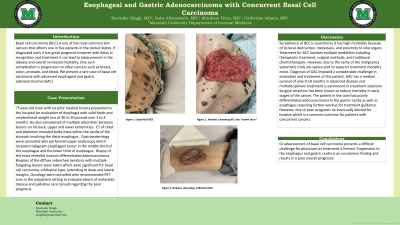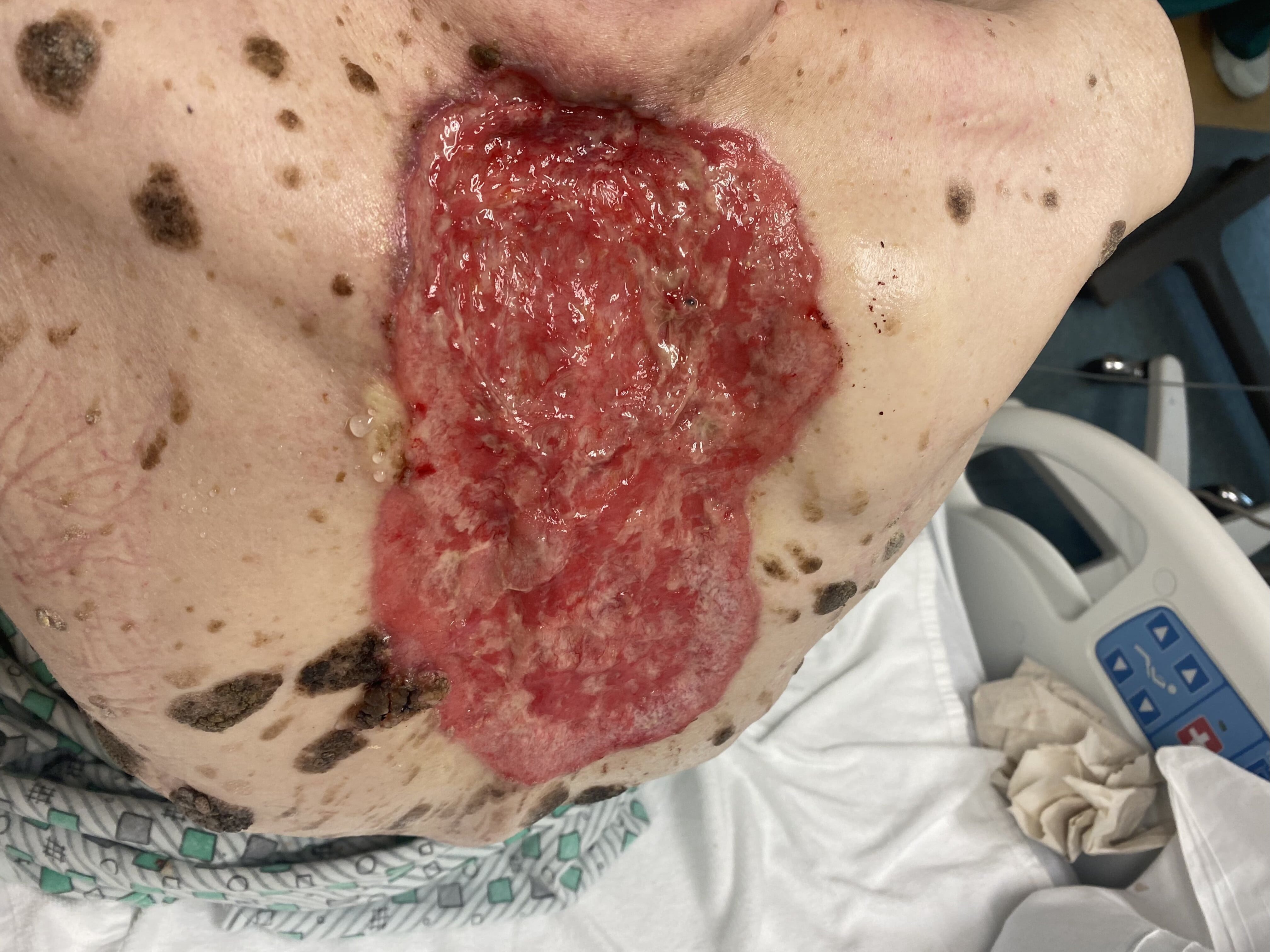Back


Poster Session B - Monday Morning
Category: Stomach
B0725 - Esophageal and Gastric Adenocarcinoma with Concurrent Basal Cell Carcinoma
Monday, October 24, 2022
10:00 AM – 12:00 PM ET
Location: Crown Ballroom

Has Audio
- DS
Davinder Singh, MD
Marshall University
Huntington, WV
Presenting Author(s)
Davinder Singh, MD1, Saba Altarawneh, MD2, Abraham Titus, MD3, Catherine Adams, MD1
1Marshall University, Huntington, WV; 2Marshall University Joan C. Edwards School of Medicine, Huntington, WV; 3Marshall University School of Medicine, Huntington, WV
Introduction: Basal cell carcinoma (BCC) is one of the most common skin cancers that affects one in five patients in the United States. If diagnosed early it has great prognosis however with delay in recognition and treatment it can lead to advancement in the disease and overall increased mortality. One such complication is progression to other cancers such as breast, colon, prostate, and blood. We present a rare case of basal cell carcinoma with advanced esophageal and gastric adenocarcinoma (GAC).
Case Description/Methods: 75-year-old male with no prior medical history presented to the hospital for evaluation of dysphagia with solid foods and unintentional weight loss of 40 to 50 pounds over 3 to 4 months. He also complained of multiple seborrheic keratosis lesions on his back, upper and lower extremities. CT of chest and abdomen revealed bulky mass within the cardia of the stomach involving the distal esophagus. Gastroenterology were consulted who performed upper endoscopy which revealed malignant esophageal tumor in the middle third of the esophagus and the lower third of esophagus. Biopsy of the mass revealed invasive differentiated adenocarcinoma. Biopsies of the diffuse seborrheic keratosis with multiple fungating lesions were taken which were significant for basal cell carcinoma, infiltrative type, extending to deep and lateral margins. Oncology were consulted who recommended PET scan in the outpatient setting to evaluate extent of metastatic disease and palliative care consult regarding overall poor prognosis.
Discussion: Surveillance of BCC is essential as it has high morbidity because of its local destruction, metastasis, and proximity to vital organs. Treatment for BCC involves multiple modalities including therapeutic treatment, surgical methods, and traditional chemotherapies. However, due to the rarity of the malignancy systematic trials are sparce and no superior treatment modality exists. Diagnosis of GAC imposed a considerable challenge in evaluation and treatment of this patient. GAC has a median survival of only 9-10 months in advanced disease and multidisciplinary treatment is paramount in treatment selection. Surgical resection has been shown to reduce mortality in early stages of the cancer. The patient in the case had poorly differentiated adenocarcinoma in the gastric cardia as well as esophagus requiring further workup for treatment guidance. However, due to poor prognosis he eventually elected for hospice which is a common outcome for patients with concurrent cancers.

Disclosures:
Davinder Singh, MD1, Saba Altarawneh, MD2, Abraham Titus, MD3, Catherine Adams, MD1. B0725 - Esophageal and Gastric Adenocarcinoma with Concurrent Basal Cell Carcinoma, ACG 2022 Annual Scientific Meeting Abstracts. Charlotte, NC: American College of Gastroenterology.
1Marshall University, Huntington, WV; 2Marshall University Joan C. Edwards School of Medicine, Huntington, WV; 3Marshall University School of Medicine, Huntington, WV
Introduction: Basal cell carcinoma (BCC) is one of the most common skin cancers that affects one in five patients in the United States. If diagnosed early it has great prognosis however with delay in recognition and treatment it can lead to advancement in the disease and overall increased mortality. One such complication is progression to other cancers such as breast, colon, prostate, and blood. We present a rare case of basal cell carcinoma with advanced esophageal and gastric adenocarcinoma (GAC).
Case Description/Methods: 75-year-old male with no prior medical history presented to the hospital for evaluation of dysphagia with solid foods and unintentional weight loss of 40 to 50 pounds over 3 to 4 months. He also complained of multiple seborrheic keratosis lesions on his back, upper and lower extremities. CT of chest and abdomen revealed bulky mass within the cardia of the stomach involving the distal esophagus. Gastroenterology were consulted who performed upper endoscopy which revealed malignant esophageal tumor in the middle third of the esophagus and the lower third of esophagus. Biopsy of the mass revealed invasive differentiated adenocarcinoma. Biopsies of the diffuse seborrheic keratosis with multiple fungating lesions were taken which were significant for basal cell carcinoma, infiltrative type, extending to deep and lateral margins. Oncology were consulted who recommended PET scan in the outpatient setting to evaluate extent of metastatic disease and palliative care consult regarding overall poor prognosis.
Discussion: Surveillance of BCC is essential as it has high morbidity because of its local destruction, metastasis, and proximity to vital organs. Treatment for BCC involves multiple modalities including therapeutic treatment, surgical methods, and traditional chemotherapies. However, due to the rarity of the malignancy systematic trials are sparce and no superior treatment modality exists. Diagnosis of GAC imposed a considerable challenge in evaluation and treatment of this patient. GAC has a median survival of only 9-10 months in advanced disease and multidisciplinary treatment is paramount in treatment selection. Surgical resection has been shown to reduce mortality in early stages of the cancer. The patient in the case had poorly differentiated adenocarcinoma in the gastric cardia as well as esophagus requiring further workup for treatment guidance. However, due to poor prognosis he eventually elected for hospice which is a common outcome for patients with concurrent cancers.

Figure: Advanced Basal Cell Carcinoma
Disclosures:
Davinder Singh indicated no relevant financial relationships.
Saba Altarawneh indicated no relevant financial relationships.
Abraham Titus indicated no relevant financial relationships.
Catherine Adams indicated no relevant financial relationships.
Davinder Singh, MD1, Saba Altarawneh, MD2, Abraham Titus, MD3, Catherine Adams, MD1. B0725 - Esophageal and Gastric Adenocarcinoma with Concurrent Basal Cell Carcinoma, ACG 2022 Annual Scientific Meeting Abstracts. Charlotte, NC: American College of Gastroenterology.
